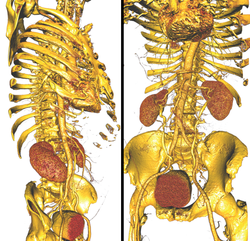
Scientific Computing and Imaging Institute
Encyclopedia
The Scientific Computing and Imaging (SCI) Institute is a permanent research institute at the University of Utah
. It is a leader in engineering and research in the areas of scientific computing, visualization, and imaging
. It focuses on solving computational and imaging problems in medicine, geophysics, chemical engineering, molecular dynamics, aerospace, fluid mechanics, combustion, and atmospheric dispersion.
 Besides research in the areas mentioned above, a particular focus of SCI has been to develop innovative and robust software packages, and release them as open source
Besides research in the areas mentioned above, a particular focus of SCI has been to develop innovative and robust software packages, and release them as open source
. Examples:
University of Utah
The University of Utah, also known as the U or the U of U, is a public, coeducational research university in Salt Lake City, Utah, United States. The university was established in 1850 as the University of Deseret by the General Assembly of the provisional State of Deseret, making it Utah's oldest...
. It is a leader in engineering and research in the areas of scientific computing, visualization, and imaging
Imaging science
Imaging science is a multidisciplinary field concerned with the generation, collection, duplication, analysis, modification, and visualization of images . As an evolving field it includes research and researchers from physics, mathematics, electrical engineering, computer vision, computer science,...
. It focuses on solving computational and imaging problems in medicine, geophysics, chemical engineering, molecular dynamics, aerospace, fluid mechanics, combustion, and atmospheric dispersion.
Associated research centers
The SCI Institute houses the NIH/NCRR Center for Integrative Biomedical Computing (CIBC) and is associated with several other national research centers:- DoEUnited States Department of EnergyThe United States Department of Energy is a Cabinet-level department of the United States government concerned with the United States' policies regarding energy and safety in handling nuclear material...
Center for the Simulation of Accidental Fires and Explosions (C-SAFE) - DoE Visualization and Analytics Center for Enabling Technologies (VACET)
- DoE Scientific Data Management Center
- DoE Center for Technology for Advanced Scientific Component Software (TASCS)
- NIH National Alliance for Medical Image Computing (NA-MIC)
- NIH Center for Computational Biology.
Open source software releases

Open source
The term open source describes practices in production and development that promote access to the end product's source materials. Some consider open source a philosophy, others consider it a pragmatic methodology...
. Examples:
- SCIRun, a scientific problem solving environmentProblem Solving EnvironmentA Problem Solving Environment is a specialized computer software for solving one class of problems, combining automated problem-solving methods with human-oriented tools for guiding the problem resolution....
(PSE) for modeling, simulation and visualization of scientific problems (includes BioPSE); - BioTensor, a program to process and visualize diffusion tensor imagesDiffusion MRIDiffusion MRI is a magnetic resonance imaging method that produces in vivo images of biological tissues weighted with the local microstructural characteristics of water diffusion, which is capable of showing connections between brain regions...
; - Seg3D, an interactive segmentation tool;
- map3d, a scientific visualization application written to display and edit complex, three-dimensional geometric models and scalar, time-based data associated with those models;
- ImageVis3DImageVis3DImageVis3D is a lightweight, open source, volume rendering application for the interactive visualization of very large volumetric data sets. It utilizes both the slice based as well as the GPU ray casting approach to visualize the volume data...
, a lightweight, feature-rich volume rendering application; and - VisTrailsVisTrailsVisTrails is a scientific workflow management system developed at the Scientific Computing and Imaging Institute at the University of Utah that provides support for data exploration and visualization. It is written in Python and employs Qt via PyQt bindings. The system is open source, released...
, a new scientific workflow management system.

